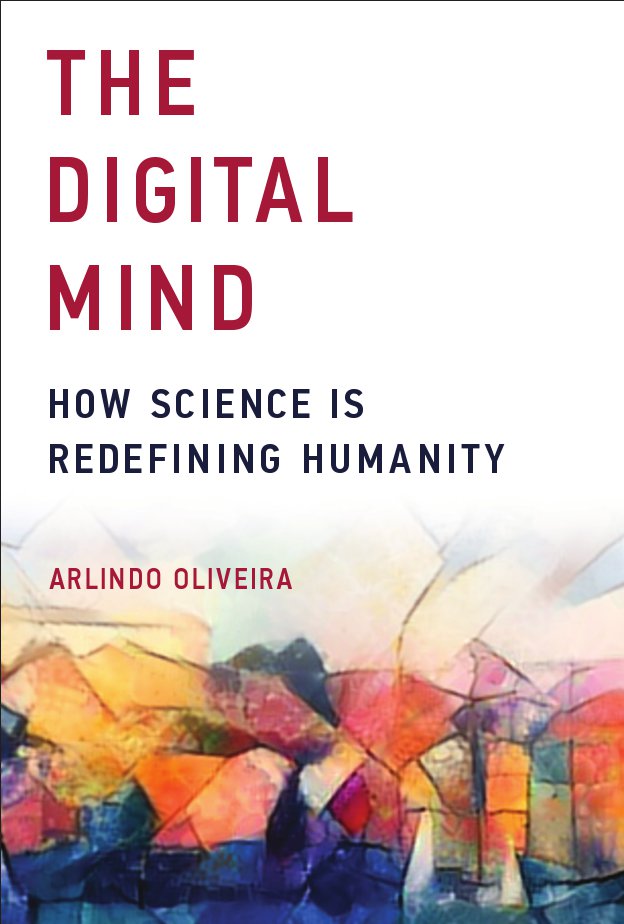A book I authored, published by MIT Press (also avaliable at Amazon). It addresses the connections between computers, life, evolution, brains and minds. It explores the relations between these seemingly unrelated fields and the impact that the rapidly advancing digital technologies will have on society.
I also run a blog, about these themes, closely related with the book.
About the book
New technologies have been introduced in human lives at an ever increasing rate, since the first significant advances took place with the cognitive revolution, some 70.000 years ago. Although electronic computers are recent and have been around for only a few decades, they represent just the latest way to process information and create order out of chaos. Before computers, the job of processing information was done by living organisms, which are nothing more than complex information processing devices, created by billions of years of evolution.
Computers execute algorithms, sequences of small steps that, in the end, perform some desired computation, be it simple or complex. Algorithms are everywhere, and they became an integral part of our lives. Evolution is, in itself, a complex and long- running algorithm that created all species on Earth. The most advanced of these species, Homo sapiens, was endowed with a brain that is the most complex information processing device ever devised. Brains enable humans to process information in a way unparalleled by any other species, living or extinct, or by any machine. They provide humans with intelligence, consciousness and, some believe, even with a soul, a characteristic that makes humans different from all other animals and from any machine in existence.
But brains also enabled humans to develop science and technology to a point where it is possible to design computers with a power comparable to that of the human brain. Artificial intelligence will one day make it possible to create intelligent machines and computational biology will one day enable us to model, simulate and understand biological systems and even complete brains with unprecedented levels of detail. From these efforts, new minds will eventually emerge, minds that will emanate from the execution of programs running in powerful computers. These digital minds may one day rival our own, become our partners and replace humans in many tasks. They may usher in a technological singularity, a revolution in human society unlike any other that happened before. They may make humans obsolete and even a threatened species or they make us super-humans or demi-gods.
How will we create these digital minds? How will they change our daily lives? Will we recognize them as equals or will they forever be our slaves? Will we ever be able to simulate truly human-like minds in computers? Will humans transcend the frontiers of biology and become immortal? Will humans remain, forever, the only known intelligence in the universe?
Contents
- THE RED QUEEN’S RACE
- Everything is Connected
- Old Dogs, New Tricks
- From Computers and Algorithms to Cells and Neurons
- THE EXPONENTIAL NATURE OF TECHNOLOGY
- Prehistoric Technologies
- The First Two Industrial Revolutions
- The Third Industrial Revolution
- The Surprising Properties of Exponential Trends
- A Generation Born with the Computer Age
- FROM MAXWELL TO THE INTERNET
- Four Equations that Changed the World
- The Century of Physics
- Transistors, Chips, and Microprocessors
- The Rise of the Internet
- The Digital Economy
- THE UNIVERSAL MACHINE
- The Analytical Engine
- Turing Machines and Computers
- Computability and the Paradoxes of Infinity
- Algorithms and Complexity
- The Church-Turing Thesis
- THE QUEST FOR INTELLIGENT MACHINES
- Artificial Intelligence
- Learning from the Past
- Perceptrons and Artificial Neural Networks
- The Formula of Reverend Bayes
- Brains, Statistics, and Learning
- CELLS, BODIES, AND BRAINS
- The Ultimate Algorithm
- Cells and Genomes
- Bodies and Brains
- BIOLOGY MEETS COMPUTATION
- Sequencing the Genome
- Biological Networks
- Emulating Life
- Digital Animals
- Synthetic Biology
- HOW THE BRAIN WORKS
- How Neurons Work
- The Brain's Structure and Organization
- Brain Development
- Plasticity, Learning, and Memory
- UNDERSTANDING THE BRAIN
- Looking Inside
- Brain Networks
- Slicing and Dicing
- Brain Simulation
- BRAINS, MINDS, AND MACHINES
- Synthetic Intelligences
- Neuromorphic Intelligent Systems
- Whole-Brain Emulation
- The Riddle of Consciousness
- CHALLENGES AND PROMISES
- Civil Rights
- Originals, Copies, and Duplicates
- Time Travel, Backups, and Rollbacks
- Living in Virtual Reality
- Personality Surgery and Other Improvements
- SPECULATIONS
- The Technological Singularity
- Through the Singularity, Dead or Alive
- The Dangers of Super-Intelligences
- Where is Everybody?
